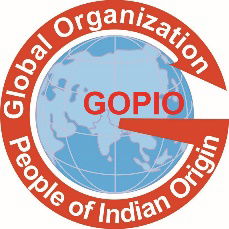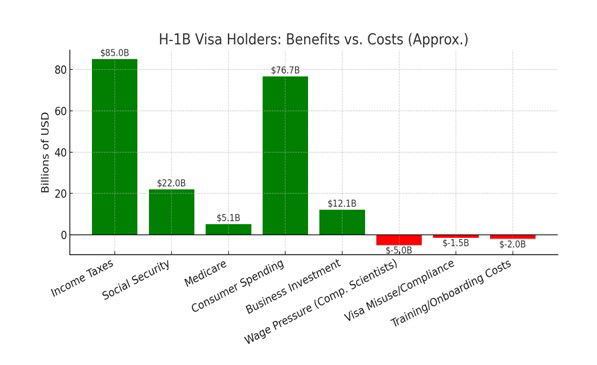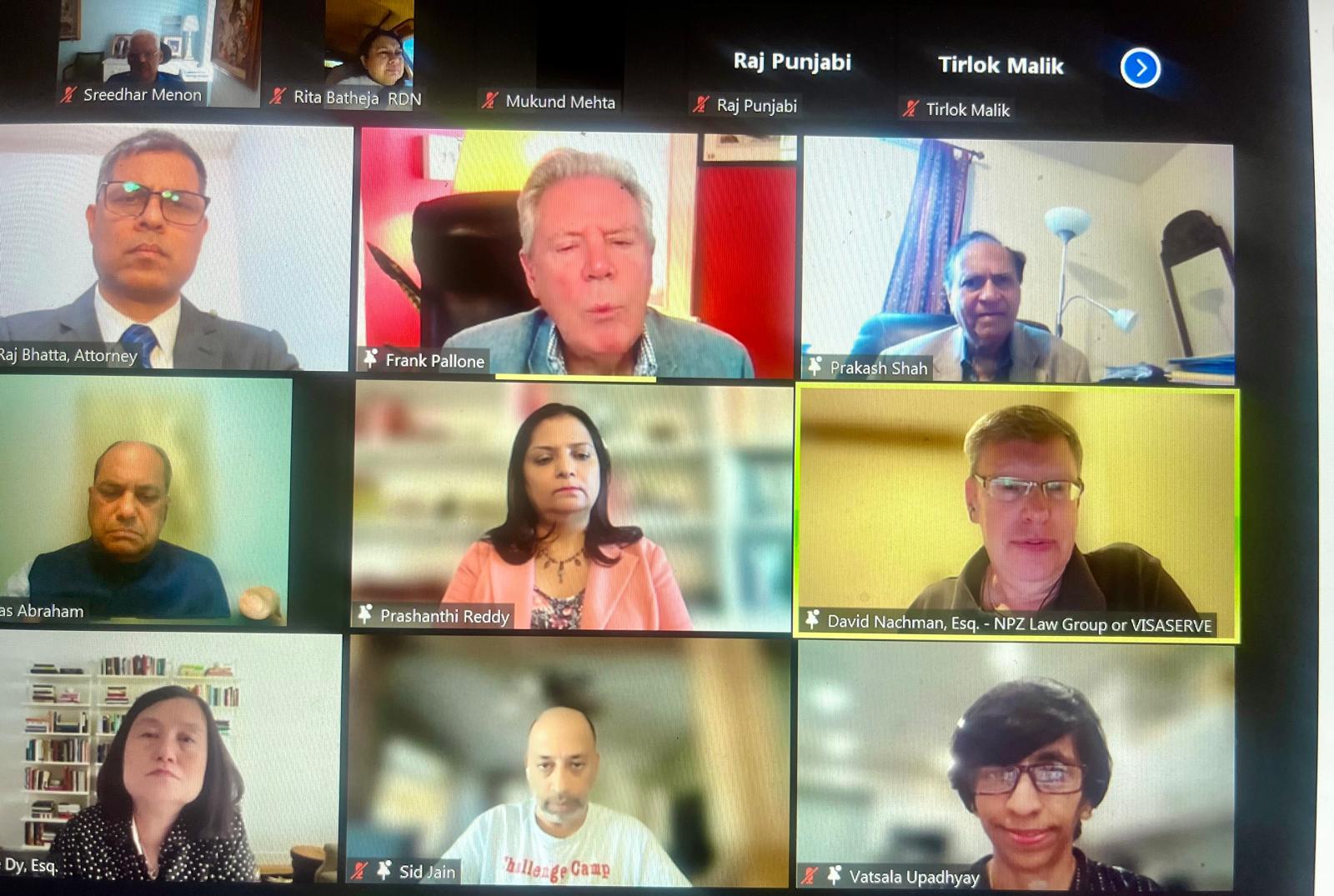America
Congressman Frank Pallone Calls for Early US-India Dialogue to Remove Current Hiccups

The Global Organization of People of Indian Origin (GOPIO) held s special Webinar on October 4th, 2025 on “H-1B Visa Storm, Current Challenges and Pathways Forward.” The event brought together four immigration attorneys as moderator and panellists with an interactive discussion with the audience.
On September 19th, 2025, a thick fog of misinformation enveloped many members of the Indian community in America who are in H-1B visa. This created confusion, uncertainty, and anxiety for applicants, U.S. companies, and the global Indian diaspora. People scrambled, trying to understand what this meant for themselves, their families, and their careers.
The program started with welcome by GOPIO’s Associate Secretary and Chair of Webinar Series Sunil Vuppala. Vuppala told the audience that unlike the monthly Webinar Series, this was organized as special Webinar because of the confusion created by the announcement including a fee increase of $100,000 which is as much as 67 times the current fee. He then introduced the GOPIO Chairman Dr. Thomas Abraham.

(Estimated Annual US Benefits and Costs of H-1B Visa Program)
Dr. Abraham said, “When President Trump announced $100,000 fee for H-1B Visa on Sept. 19th, we were shocked. We wrote our concerns to President Trump. We got a reply back from him, but it was a standard reply which didn’t touch upon the issue we had raised.”
Dr. Abraham further said that he asked ChatGPT to provide info on the US benefits and costs of H-1B Visa program, which was provided as Bar Chart showing the benefit and cost of this program. The economic contribution to the is over $200 Billion annually while the cost associated with it is $8.5 Billion. The net contribution is overwhelmingly large positive, demonstrating the critical role of skilled foreign professionals in sustaining U.S. innovation.
“The technology sector has grown in the USA because of H-1B visa program and there is strong correlation between H-1B and US innovations as patent output,” added Dr. Abraham.
The Moderator for the panel discussion was New York Immigration Attorney Dilli batta who had also worked earlier San Francisco District Attorney’s Office. The panellists included Immigration Attorney David Nachman who is a managing attorney of the New Jersey Offices of the NPZ law group, also known as Visaserve, Immigration Attorney Stephanie Dy who is an attorney with the Parikh Law Group in Chicago and New York Immigration Attorney Prashanti Reddy with her law firm.
Attorney Nachman noted during the session that the situation created what could only be described as a “torrential rainstorm,” leaving many unsure of the future. Nachman, outlined three critical changes currently affecting the H-1B program:
1.) The $100,000 fee will affect certain new H-1B petitions. This measure is limited to applicants subject to the cap, primarily those outside the U.S. who have never held an H-1B visa. Renewals, extensions, transfers, and amendments are not affected. While the administration claims the fee is designed to prevent abuse, the speakers warned it may discourage highly skilled global talent from contributing to the U.S. economy.
2.) Changes are being proposed in how the H-1B lottery is conducted, with priority given to employees receiving higher wages (Wage 1, Wage 2, Wage 3, as determined by the Department of Labor). Small businesses, which cannot afford to pay top-tier salaries, are effectively pushed to the bottom of the priority system. This shift means that H-1Bs will increasingly be decided based on money rather than merit or skill, undermining innovation and opportunity.
3.) The government is signalling more rigorous site visits and compliance checks under the new framework, investing heavily in monitoring employers. This demonstrates that H-1B filings will be scrutinized like never before, creating further uncertainty for companies seeking top talent. “H-1Bs are going to be decided on money and economy instead of the toils of the mind,” Nachman remarked, underscoring the disconnect between policy and the true value of skilled professionals.
According to Prashanti Reddy, Esq., the proclamation primarily impacts new H-1B applicants outside the U.S. who are subject to the cap, particularly those who have never been employed in sectors such as hedge funds. Renewals, transfers, and amendments remain unaffected. She also raised a crucial question regarding bipartisan movements in Congress addressing these policies. While the H-1B fee may not be the most pressing issue nationally, it represents an important issue for the Indian American community.
Immigration Attorney Shephanie Dy said the new proclamation would make burdensome for employers to hire someone new and therefor less opportunities for smaller companies to hire. For those in the outstanding level category, one has to show more evidence. Just a bachelor’s degree may not be sufficient, one has to be in in the Masters of Ph.D. level. Those who are TN professionals such as computer system analysists and computer engineers, they may explore the E2 with an investment in one’s own company.
While the administration claims that the new $100,000 fee is designed to prevent abuse, the speakers warned it may discourage highly skilled global talent from contributing to the U.S. economy. One of the panellists said that he had hardly seen any abuse. The number of resumes he had seen were as long as 25 pages with a large number of publications and patents. This action will make US miss out in the technology race, the panel agreed.
The speakers at the session further emphasized that the current policy upheaval extends far beyond H-1B visas, affecting tariffs, lottery mechanisms, and international competitiveness. They highlighted that the combination of fees, enforcement measures, and lottery changes could have lasting consequences for U.S. innovation and global leadership and stressed the urgency of proactive community engagement and informed advocacy.
GOPIO President Prakash Shah then introduced the Chief Guest of the event Senior US Congressman Padma Bhushan Frank Pallone Jr., who is serving his 18th full term in the U.S. House of Representatives. Pallone represents New Jersey's 6th Congressional District and is a founder of India Caucus in the Congress.
The session highlighted concerns that the Trump administration is focusing on the wrong priorities. Rep. Pallone emphasized that rather than investing in training programs to develop locally qualified talent, billions are being spent on a fee that does not address the root problem. Linking the $100,000 H-1B fee to tariffs, adjusting the lottery to favour higher-paid employees, and disadvantaged small businesses create economic distortions.
“This policy shifts focus from building local skills to simply generating revenue,” Pallone noted, stressing that small businesses and innovative sectors may be unfairly impacted. He also warned that in the global competition for talent, countries like Germany and China are ready to attract highly qualified professionals, which could ultimately weaken the U.S. economy instead of strengthening it.
Rep. Pallone said, “Meanwhile, India’s pivot toward countries such as Russia and China - partially in response to U.S. policy - raises additional strategic and economic concerns.” Rep. Pallone called for an early US-India Dialogue to remove the current hiccups.
Rep. Pallone’s presence at the session was both symbolic and practical, reflecting his longstanding commitment to the Indian American community. He had kept his promise to establish the Congressional India Caucus, ensuring that the Diaspora’s voice was represented in national policymaking and that their contributions to U.S. innovation and growth are recognized and protected.
The session underscored the urgent need for informed dialogue, proactive community engagement, and bipartisan advocacy. GOPIO International continues to champion the Indian diaspora, ensuring that the U.S. remains a destination for top global talent, while fostering stronger integration of the community into the economic and civic mainstream.
Looking ahead, the session underscored the urgent need for informed dialogue, proactive community engagement, and bipartisan advocacy. GOPIO International continues to champion the Indian Diaspora, ensuring that the U.S. remains a destination for top global talent, while fostering stronger integration of the community into the economic and civic mainstream.
Congressman Pallone pointed out that there was a broad bipartisan support in Congress for continuing the H1B Visa program and he felt that the Indian American community and organization such as GOPIO should engage with the Members of Congress to help develop a Consensus towards a more considered approach towards preserving the many benefits of the H1B Visa Program that has led to many positive outcomes for the US Economy.

(Rep. Frank Pallone with GOPIO officials and speakers at the Webinar, From l. to r., Top Row: Dilli batta, Rep. Frank Pallone Jr., Prakash Shah; Middle Row: Dr. Thomas Abraham, Prashanti Reddy, David Nachman; Bottom Row: Stephanie Dy, Siddarth Jain and Vatsala Upadhayay)
GOPIO General Secretary Siddharth Jain gave the vote thanks. Ms. Vatsala Upadhyay, Founder & CEO of AI Junoon, provided technical support. GOPIO plans to continue the engagement with congressional leaders.
About GOPIO - Founded in 1989, GOPIO is a non-partisan, not-for-profit, secular organization with Individual Life Members and chapter delegates from over 100 chapters in 36 countries. GOPIO’s volunteers are committed to enhancing cooperation and communication between NRIs/PIOs and the local communities, building networks, bonds, friendships, alliances, and the camaraderie of citizens and colleagues alike. GOPIO volunteers believe that when they help network the global Indian community, they facilitate making tomorrow a better world for the Indian Diaspora, the countries they live in and India.







































